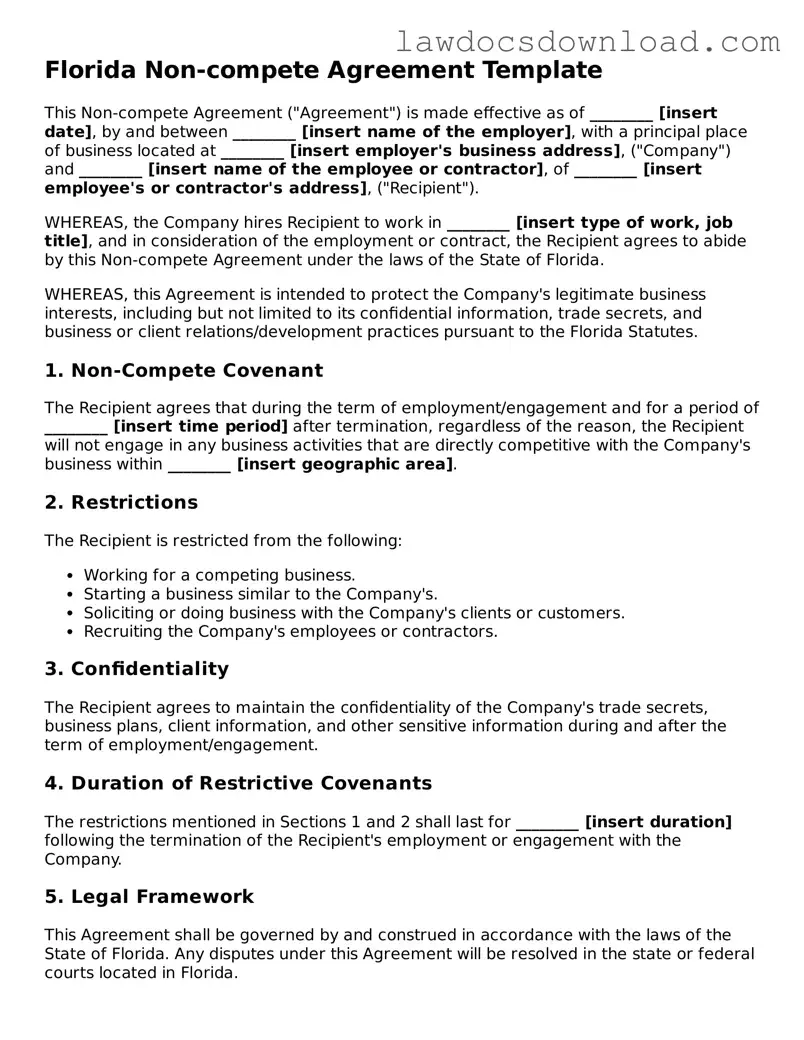Florida Non-compete Agreement Template
This Non-compete Agreement ("Agreement") is made effective as of ________ [insert date], by and between ________ [insert name of the employer], with a principal place of business located at ________ [insert employer's business address], ("Company") and ________ [insert name of the employee or contractor], of ________ [insert employee's or contractor's address], ("Recipient").
WHEREAS, the Company hires Recipient to work in ________ [insert type of work, job title], and in consideration of the employment or contract, the Recipient agrees to abide by this Non-compete Agreement under the laws of the State of Florida.
WHEREAS, this Agreement is intended to protect the Company's legitimate business interests, including but not limited to its confidential information, trade secrets, and business or client relations/development practices pursuant to the Florida Statutes.
1. Non-Compete Covenant
The Recipient agrees that during the term of employment/engagement and for a period of ________ [insert time period] after termination, regardless of the reason, the Recipient will not engage in any business activities that are directly competitive with the Company's business within ________ [insert geographic area].
2. Restrictions
The Recipient is restricted from the following:
- Working for a competing business.
- Starting a business similar to the Company's.
- Soliciting or doing business with the Company's clients or customers.
- Recruiting the Company's employees or contractors.
3. Confidentiality
The Recipient agrees to maintain the confidentiality of the Company's trade secrets, business plans, client information, and other sensitive information during and after the term of employment/engagement.
4. Duration of Restrictive Covenants
The restrictions mentioned in Sections 1 and 2 shall last for ________ [insert duration] following the termination of the Recipient's employment or engagement with the Company.
5. Legal Framework
This Agreement shall be governed by and construed in accordance with the laws of the State of Florida. Any disputes under this Agreement will be resolved in the state or federal courts located in Florida.
6. Agreement Modification and Waiver
No modification of this Agreement shall be valid unless in writing and agreed upon by both Parties. The failure of either party to enforce any provision of this Agreement shall not be considered a waiver of that provision or the right to enforce it in the future.
7. Severability
If any provision of this Agreement is found to be invalid or unenforceable, the remainder of the Agreement will continue to be in full force and effect.
8. Entire Agreement
This document contains the entire agreement between the Parties regarding the subject matter herein and supersedes all prior or contemporaneous agreements, understandings, and negotiations.
IN WITNESS WHEREOF, the Parties have executed this Non-compete Agreement as of the date first written above.
Company Signature: _______________________________ Date: __________
Recipient Signature: ______________________________ Date: __________

